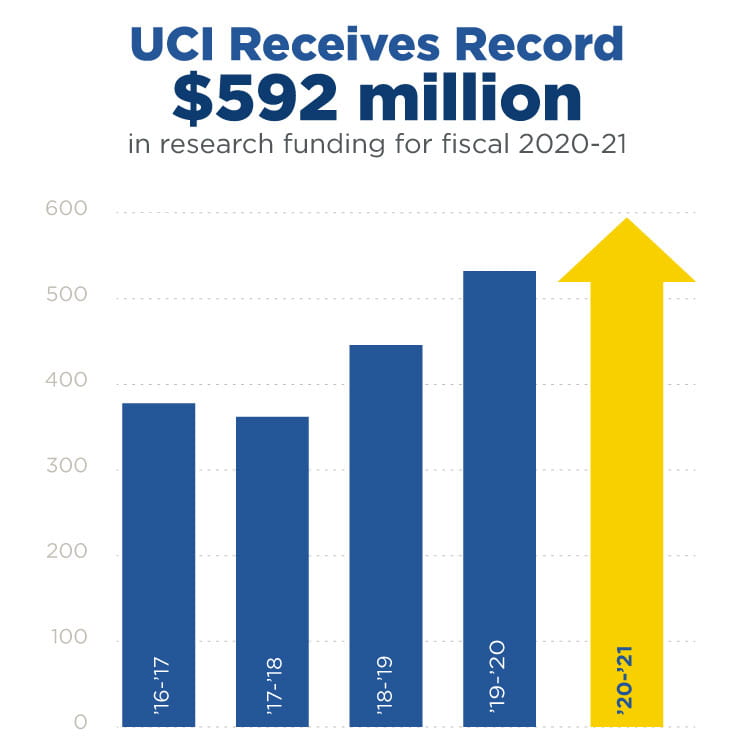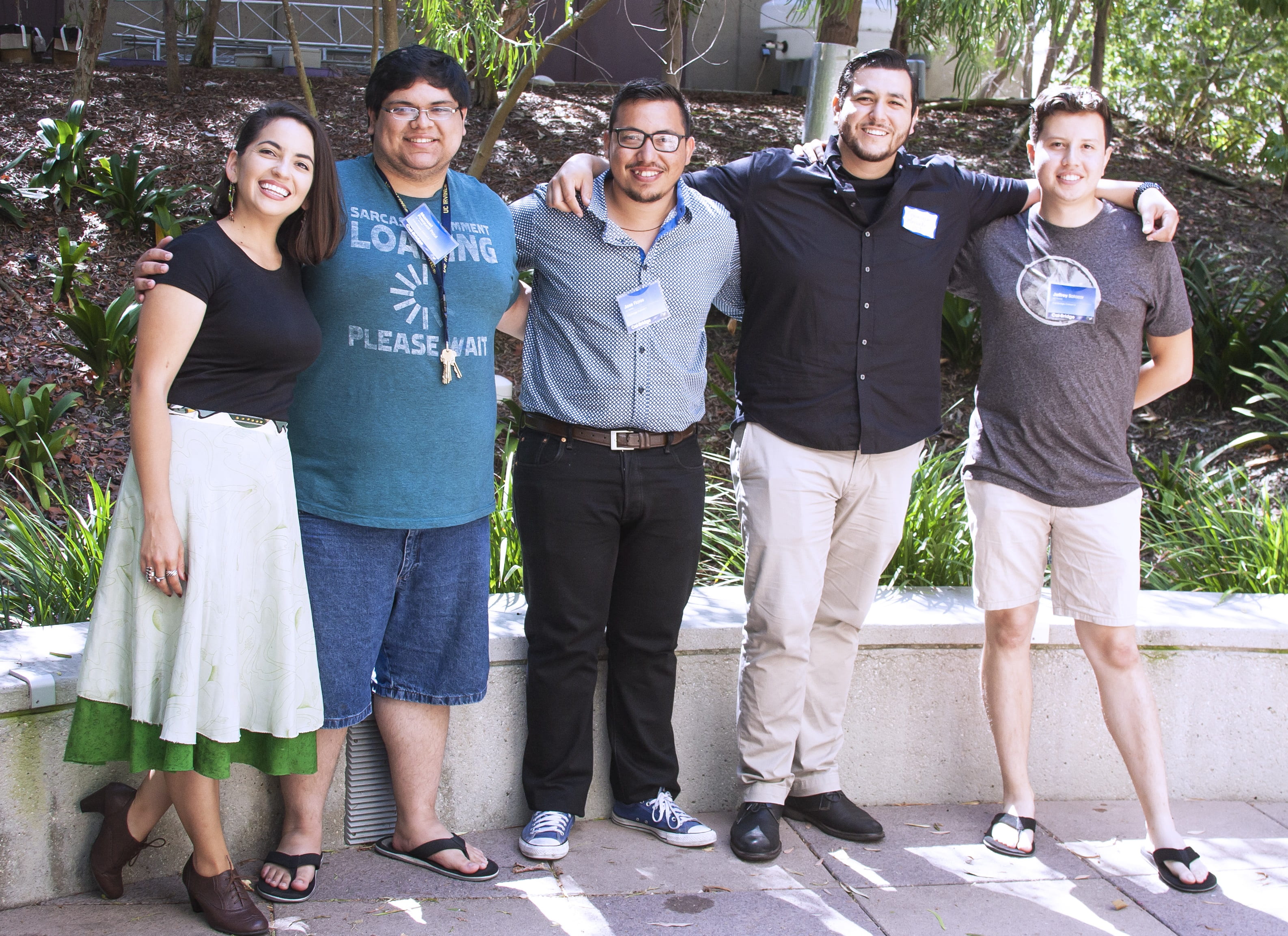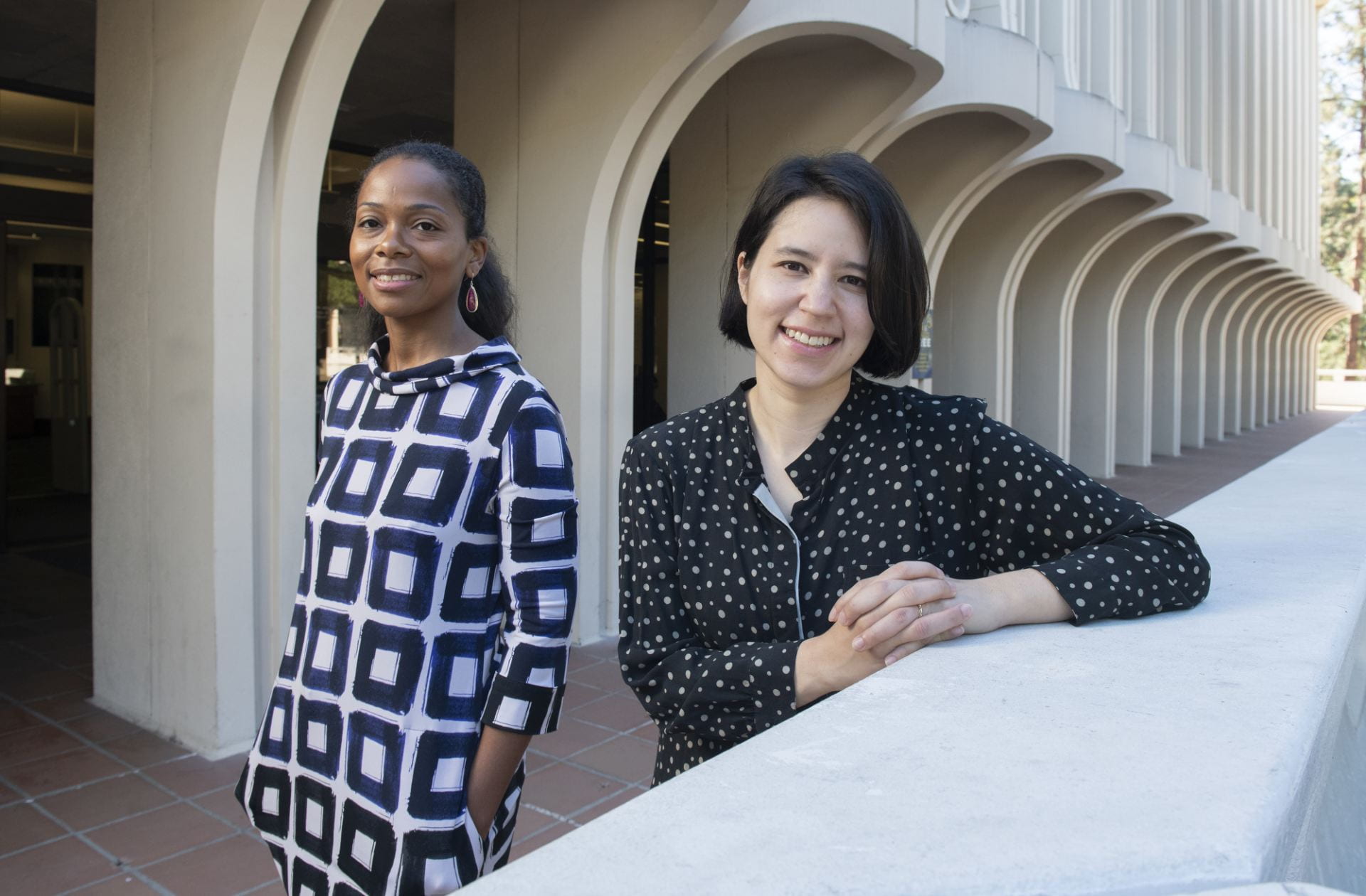UCI receives record $592 million in research funding for fiscal 2020-21
12 percent more than last year, amount reflects strong support for campus mission

Irvine, Calif., Aug. 2, 2021 — From cutting-edge research for advancing precision medicine to an innovative new effort for improving public water infrastructure to increase conservation, University of California, Irvine scholars, scientists and physicians are blazing new paths to help change the world. And their impact keeps growing. In fiscal 2020-21, which ended June 30, UCI received the most research funding in campus history: $592 million in grants and contracts.
Awards from federal and state agencies, leading foundations and forward-thinking companies increased by 12 percent over the 2019-20 total of $529 million, reflecting strong support for UCI’s top-ranked faculty, first-rate facilities, diverse and talented student body, and community-based programs.
“This research funding milestone confirms UCI’s ascent among its Association of American Universities peers as a world-class research university. Despite the hurdles we have faced during the COVID-19 pandemic, the UCI community continues to make a meaningful impact on regional economic development and to improve society through globally prominent research,” said UCI Chancellor Howard Gillman.

“Our faculty, students and staff are truly excelling in an environment of tremendous competition for financial support of research and innovation,” said Pramod Khargonekar, UCI vice chancellor for research. “These results indicate that UCI’s preeminent research enterprise will make even greater and more productive contributions to the state, the nation and the world.”
UCI investigators received 1,012 new awards, totaling nearly $275 million (about 46 percent of the entire campus amount, with the remainder coming from renewed funding sources), in fiscal 2020-21. The U.S. Department of Health & Human Services, which encompasses the National Institutes of Health, was the largest single source of research funding at UCI, accounting for $180 million. The National Science Foundation provided $50 million. And gifts and grants from philanthropic foundations and charitable trusts reached $86 million. Overall, 39 percent of research support came from nonfederal entities.
Promoting new cures
More than $340 million of all UCI research funding in fiscal 2020-21 was for biomedical and health sciences clinical work across campus.
One thriving site of this is UCI’s Chao Family Comprehensive Cancer Center – Orange County’s only National Cancer Institute-designated comprehensive cancer center. Its researchers brought in $55 million for basic, translational and clinical studies in fiscal 2020-21, 24 percent more than last year.
Also continuing to increase was total financial backing for clinical trials in all health science areas to advance new treatments for life-altering diseases. In 2020-21, UCI received $94 million in grant and corporate funding from all sources for clinical trials, a 34 percent jump over the previous year. Within this amount, industry support topped $81 million for the first time.
An essential role in supporting the UCI clinical trial enterprise was played by the Center for Clinical Research, the UCI centralized clinical trial unit. The CCR physicians and research staff conducted over 200 studies in 2020-21 and were awarded over $22 million in industry and federal funding, a 134 percent increase over the last year.
The following are clinical trials with top contracts:
- With $4.7 million from jCyte Inc., Dr. Mitul Mehta, an ophthalmologist with UCI’s Gavin Herbert Eye Institute, is undertaking a Phase 2 study of a stem cell-derived treatment for adults with retinitis pigmentosa.
- With $4.2 million from Syneos Health, Dr. Krishnansu Tewari, professor of gynecologic oncology, is leading UCI Health’s participation in a Phase 1 study evaluating the tolerability and safety profile of a new drug called ASP1951 in people with locally advanced or metastatic solid tumors.
- With $3.2 million from Covance, Dr. Sai-Hong Ou, UCI clinical professor of hematology/oncology, is heading a Phase 1/2 dose escalation and expansion study of an antibody drug called MCLA-129 in individuals with advanced non-small cell lung cancer and other solid tumors.
“The health and well-being of our patients depends on the cutting-edge, evidence-based care we provide every day to prevent illness and to personalize treatments in the face of disease. UCI offers the very best care because we advance the frontiers of knowledge through groundbreaking research,” said Dr. Steve Goldstein, vice chancellor for health affairs. “UCI is the region’s only university-based health system, and year-over-year growth in external funding underscores how we are leading the way by empowering discoveries and training the diverse, interprofessional healthcare workforce of the future to carry on that legacy.”
Other noteworthy new research awards and recipients in 2020-21:
- The National Institute on Aging awarded two grants totaling $5.7 million to the UCI Institute for Memory Impairments and Neurological Disorders to advance research on neurodegenerative diseases.
- The National Institutes of Health awarded $2 million to researchers in UCI’s Henry Samueli School of Engineering to develop a biologic implant for the spinal facet joint. This grant, given to a team led by Kyriacos Athanasiou, Henry Samueli Chair in Engineering and Distinguished Professor of biomedical engineering, will be the first to focus on the treatment of facet joint degeneration, a highly prevalent contributor to back pain.
- A $1.1 million grant from Arnold Ventures will fund research on an expansive examination of family engagement among incarcerated persons and correctional staff who are responsible for all aspects of family contact and engagement. Nancy Rodriguez, UCI professor of criminology, law & society, is conducting the research with colleagues Elizabeth Cauffman, professor of psychological science, and Susan Turner, professor of criminology, law & society.
- Researchers led by Bernadette Boden-Albala, professor and founding dean of UCI’s future School of Population & Public Health, inked a $2.9 million contract with the city of Santa Ana to create a truly representative sample of residents with SARS-CoV-2 antibodies. The study’s aim was to understand patterns of racial and ethnic disparities, which raise the question of what social, biological and environmental factors – known as the social determinants of health – influence the spread of COVID-19.
- A collaborative team led by Dr. Tallie Z. Baram, Donald Bren Professor and director of the Conte Center @ UCI, received a three-year state grant of more than $2.3 million to address the health impacts of adverse childhood experiences using precision medicine.
- June Ahn, UCI associate professor of education, was awarded a three-year, $500,000 grant from the Bill & Melinda Gates Foundation to conduct a study identifying factors that motivate youth toward careers. Ahn and his team will be working with K-12 after-school program educators to gain an understanding of the key experiences that shape youngsters’ identity and spark their interest in pursuing careers in technology, media and related industries.
- Researchers in UCI’s Donald Bren School of Information & Computer Sciences are working to address water resource issues with a $1.5 million grant from the National Science Foundation through its Smart & Connected Communities Nalini Venkatasubramanian, professor of computer science, leads the project, which aims to foster greater interoperability among drinking water, stormwater and wastewater infrastructure.
- The UCI School of Humanities received a four-year, $1.5 million grant from the Andrew W. Mellon Foundation to introduce graduate students to a broad range of possible careers that employ their expertise.
- Jennifer Prescher, UCI professor of chemistry, was awarded $1.5 million from the Paul G. Allen Family Foundation to further the use of bioluminescent tools for noninvasive, real-time imaging of the changes that occur in intracellular metabolic pathways in immune cells as they activate.
If you want to learn more about supporting this or other activities at UCI, please visit the Brilliant Future website. Publicly launched on Oct. 4, 2019, the Brilliant Future campaign aims to raise awareness and support for UCI. By engaging 75,000 alumni and garnering $2 billion in philanthropic investment, UCI seeks to reach new heights of excellence in student success, health and wellness, research and more. Learn more by visiting: https://brilliantfuture.uci.edu/areas-to-support.
About the University of California, Irvine: Founded in 1965, UCI is the youngest member of the prestigious Association of American Universities and is ranked among the nation’s top 10 public universities by U.S. News & World Report. The campus has produced three Nobel laureates and is known for its academic achievement, premier research, innovation and anteater mascot. Led by Chancellor Howard Gillman, UCI has more than 36,000 students and offers 224 degree programs. It’s located in one of the world’s safest and most economically vibrant communities and is Orange County’s second-largest employer, contributing $7 billion annually to the local economy and $8 billion statewide. For more on UCI, visit www.uci.edu.
Media access: Radio programs/stations may, for a fee, use an on-campus ISDN line to interview UCI faculty and experts, subject to availability and university approval. For more UCI news, visit wp.communications.uci.edu. Additional resources for journalists may be found at communications.uci.edu/for-journalists.

